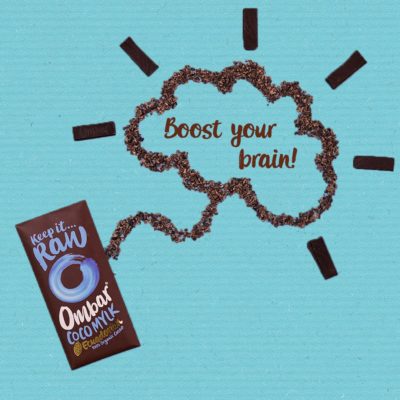Wellbeing
If you’ve read our previous posts, then you know that cacao has many potential health benefits. But did you know it could be particularly good for the brain and cognitive function (meaning mental processes such as memory, learning, reasoning and attention)?
In a recent article in the journal Frontiers in Nutrition, Italian researchers reviewed several studies focusing on the more immediate effects of cacao – as in, what happens just after consuming it. Although some of the studies showed no benefits, others found that cacao could improve working memory, reaction times, attention, visual information processing (how fast people processed and reacted to something they saw) and tasks such as subtraction.1,2
As well as these immediate effects, cacao could have longer-term protective benefits for the brain and memory, even into old age. In one study on 90 elderly people with mild cognitive impairment (a condition that can lead to dementia), consuming high-flavanol cacao for eight weeks seemed to improve their cognitive function3. And in animal studies cacao has been found to help prevent changes in the brain that are linked to Alzheimer’s disease4. So, cacao could help us ward off memory problems as we get older too.
So, what is cacao actually doing to help the brain?
It’s the flavanols in cacao that are thought to have the most powerful action. (To read more about flavanols – what they are and what they do – see our previous post here.) It’s been found that cacao flavanols can get into the brain and accumulate in areas responsible for learning and memory6. And when they get there, they could help the brain in several ways:
1. Protection.
Cacao flavanols have been found to trigger production of proteins that protect nerve cells in the brain4.
2. Helping to grow your brain!
As well as those protective proteins, flavanols seem to increase levels of a complex-sounding substance called ‘brain-derived neurotropic factor’5. This is a protein that stimulates growth of nerves in the brain and the connections between them, and helps to repair nerves after they've been damaged.
3. Boosting blood circulation to the brain.
Consuming high-flavanol cacao seems to improve blood flow in the brain by helping dilate the blood vessels2. It may even encourage the growth of new blood vessels6. This could have immediate benefits for cognitive processes such as attention and focus, but could also help longer term by improving delivery of nutrients to the brain.
4. Reducing insulin resistance.
Insulin resistance is when the body’s cells become less responsive to insulin, leading to poorly controlled blood sugar levels. Because high blood sugar can have a damaging effect on the nerves – including in the brain – it’s thought that insulin resistance can be a factor in brain ageing and problems such as dementia. Studies have suggested cacao can improve sensitivity to insulin7, so it could be helping in this way too.
5. Anti-inflammatory action.
Last but not least, cacao flavanols may help long-term cognitive function by having an anti-inflammatory effect2. It’s thought that inflammation plays a role in problems such as cognitive impairment or dementia, and so anything that helps bring down or control inflammation could be beneficial for the brain and keeping our memory sharp.
Why raw is best
All cacao, cocoa and high-cocoa chocolate may have benefits for the brain. But because it’s specifically the flavanols in cacao that are thought to be responsible for its brain-boosting and brain-protecting action, raw cacao or raw chocolate could have an advantage, as the gentle low-temperature production process used in manufacturing raw chocolate helps to preserve the maximum content of flavanols.
References
- Socci V et al. Enhancing Human Cognition with Cocoa Flavonoids. Front Nutr. 2017 May 16;4:19.
- Lamport DJ et al. The effect of flavanol-rich cocoa on cerebral perfusion in healthy older adults during conscious resting state: a placebo controlled, crossover, acute trial. Psychopharmacology (Berl). 2015 Sep;232(17):3227-34.
- Desideri G et al. Benefits in cognitive function, blood pressure, and insulin resistance through cocoa flavanol consumption in elderly subjects with mild cognitive impairment: the Cocoa, Cognition, and Aging (CoCoA) study. Hypertension. 2012 Sep;60(3):794-801.
- Williams RJ, Spencer JP. Flavonoids, cognition, and dementia: actions, mechanisms, and potential therapeutic utility for Alzheimer disease. Free Radic Biol Med. 2012 Jan 1;52(1):35-45.
- Neshatdoust S et al. High-flavonoid intake induces cognitive improvements linked to changes in serum brain-derived neurotrophic factor: Two randomised, controlled trials. Nutr Healthy Aging. 2016 Oct 27;4(1):81-93.
- Sokolov AN et al. Chocolate and the brain: neurobiological impact of cocoa flavanols on cognition and behavior. Neurosci Biobehav Rev. 2013 Dec;37(10 Pt 2):2445-53.
- Mastroiacovo D et al. Cocoa flavanol consumption improves cognitive function, blood pressure control, and metabolic profile in elderly subjects: the Cocoa, Cognition, and Aging (CoCoA) Study--a randomized controlled trial. Am J Clin Nutr. 2015 Mar;101(3):538-48.


